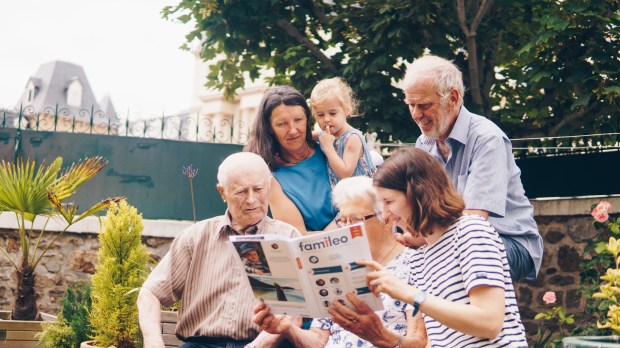“There is no such thing as love in the abstract, only proof of love. That’s what Famileo is all about.” says Armel de Lesquen, the 41-year-old co-founder of Famileo, who doesn’t mince words.
The startup, which he launched in 2014 with Tanguy de Gélis, offers an app for creating family “gazettes” where each family member can write messages and share photos. All messages are automatically formatted and printed as a personalized paper journal. Then they are mailed out on a regular basis.
Entrepreneurial success stories are often rooted in a real-life story; a personal experience. This is the case with Famileo. The idea started to germinate in Tanguy de Gélis’ mind six years ago when his grandmother complained about not having much news from her grandchildren—she who loved letters and postcards.
The idea suddenly unfolded when, on his way to Mass one Sunday evening in a retirement home run by nuns, he saw all these grandparents, alone. He decided to share his idea with Armel de Lesquen, and together they refined the concept.
They met with directors of retirement homes and professionals working in the field of gerontology. They had more and more conversations with them in order to better respond to the problems encountered by families and isolated grandparents. “We started in retirement homes because it’s more complicated to maintain a regular social link with families who are often geographically distant,” explains Armel de Lesquen. “You can’t imagine how much the residents need it.”
Unlike a WhatsApp group where messages are addressed to everyone, the gazette’s messages are addressed directly to grandparents, although other members can read them. “You don’t write the same way to your grandmother as to your friends. … Everyone is aware that these are signs of affection that they are sending to their loved ones,” summarizes the co-founder of the startup. “Famileo gives strength to the family network! It’s also a network of altruists, of those who are aware of the importance of these proofs of love.”
How does Famileo work in practice? One of the members of a family, often one of the grandchildren, will subscribe the family to Famileo and thus receive a confidential family code. It’s up to that first person to pass it on to his cousins, brothers, sisters, etc. “This code will allow the different users to join the network of the person receiving the newsletter, for example a common grandmother,” explains Armel de Lesquen.
Each member is able to post messages, photos, texts… and thus fill a family wall. “It’s a bit like Whatsapp except that every month [more or less] the messages will be transformed into a paper journal and sent by mail to the recipient’s home,” continues Armel de Lesquen.
It should be noted that each gazette is limited to 30 messages and can be fed by up to 60 users. “We aren’t opposed to digital technology at all,” he says. “Some grandparents are very comfortable with digital, but for them, receiving the gazette is something different. Unlike a WhatsApp message that comes and goes very quickly, the gazette is a paper medium that they can keep and reread from time to time.”
40,000 gazettes printed each week
So far, it’s been a success: Famileo, which now employs about 40 people, has 160,000 families as users. It’s a figure that has almost doubled during the pandemic.
Every week, nearly 40,000 gazettes are printed “all over the world,” says Armel de Lesquen with satisfaction. “And the price is the same, whether the gazette is delivered to Bordeaux, Brittany, Singapore or Tokyo.” Famileo’s income, which is mainly generated in France, is still growing at an astonishing rate this year.
There’s no question of the startup stopping there. Famileo now has a subsidiary in Barcelona, Spain, and has established itself in the United Kingdom. A subsidiary was also opened in the United States two months ago. In November, Armel de Lesquen will move there for a year.
“I’m going there to structure this subsidiary and refine the project on site. In the United States, we’ll mainly work with senior residences” and will promote the service to individuals in a second phase, he explains.
Because relationships are at the heart of its entrepreneurial project, Famileo has also decided to build connections with the world of non-profit organizations. “In 2021, we created a foundation that donates part of our profits to associations or charities that are dear to us,” such as the Little Sisters of the Poor, summarizes Armel de Lesquen.
Sensitive to issues of disability and inclusion, the founders also decided to rely on Handirect, a network of agencies that employ people with disabilities, to print the gazettes. “Their agencies take care of printing, enveloping and postage,” summarizes the co-founder.
“We currently work with six agencies, i.e. about 30 people, but we are gradually filling them up! There are still about 20 of them in France,” he says. “It’s a great adventure because at the beginning we were just a small client and today we’re their main client.”
And the prospects for growth are still numerous. Although Famileo is known for its gazettes sent to grandparents, some of them are also used by families where one of the children is disabled.
“Unfortunately, very often the only letters that disabled children receive are those from the insurance company or a regional health agency,” says the co-founder. “In these cases, it’s the cousins, brothers and sisters, uncles and aunts who write, and the disabled child is the recipient.”
Some families also make unexpected use of it. “Sometimes a gazette is created to be sent to a husband who’s in the military, when he’s deployed on an overseas operation,” says Armel de Lesquen. These numerous uses, which meet the needs of each family, are fully in line with Famileo’s DNA: creating and nourishing connections at all levels.
In partnership with Famileo



